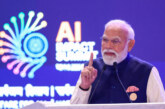Dr. Arvind Kumar*
The ongoing Ukrainian crisis does not augur well for global peace and security because its geopolitical and geo-economic implications entail the potential of affecting almost the entire international community, albeit in varying degrees. Apart from ushering in an era of political instability in Europe and spurring the arms race, it will trigger an economic crisis for the entire humankind which is still struggling to overcome the shocks of COVID-19 and its new variant Omicron.
Undoubtedly, the Russian invasion of its neighbouring country Ukraine on 24 February has not taken the world by surprise because speculations were rife in this regard for the past many weeks in view of border tensions building between the two countries; nevertheless, the political and economic fallout entails the potential of impacting world politics in a big way. Ukraine, a country located in Eastern Europe and a former Republic of the erstwhile Soviet Union, having an area of 603, 628 sq. km., is the second-largest country by area in Europe after Russia. It shares borders with Russia to the east and northeast. While sharing its borders with Belarus to the north, Ukraine also shares borders with Poland, Slovakia, and Hungary to the west, Romania, and Moldova to the south, and its coastline extends along the Sea of Azov and the Black Sea.

Apprehensions of many countries, especially the United States and other Western countries about the impending Russian attack on Ukraine that had been building up for weeks became a reality in the early hours of 24 February when the Russian forces embarked on a large-scale invasion. Media reports indicated the entry of the Russian forces from many directions and heading toward Kyiv, the capital of Ukraine. The exchange of armed hostilities has reported claimed heavy casualties on both sides. The US President Joe Biden and leaders of other Western countries have criticised the Russian attack as a blatant violation of international law. While announcing the promulgation of US sanctions against Russia on 24 February, President Biden said that new sanctions were designed to maximise the long-term impact on Russia and minimise the impact on the US and its allies.
As per media reports, tensions were building up between Moscow and Kyiv over the alleged proximity of Ukraine to NATO over the past many months, and Russia took the plea that reported proximity of Ukraine to NATO portended an ominous threat to the security of Russia and using this as a ploy, Russia launched a multi-pronged attack supported by tanks and other heavy military equipment rolling into several borders of Ukraine, especially in separatist-controlled areas in the east which have formally been accorded recognition by Moscow.
Putin’s Game Plan

The Russian President Vladimir Putin in a telecast on 24 February counted the reasons behind his game plan of invading Ukraine. Undoubtedly, President Putin had been a vocal critic of NATO’s eastward expansion in the aftermath of the unravelling of the erstwhile Soviet Union; nonetheless, his game plan of the timing of attacking Ukraine by using that argument as a pretext is what has surprised many dispassionate observers. Presently NATO has 30 member countries and NATO claims that its membership is open to any European country that meets its criteria. NATO’s statement that Ukraine is among three nations that are considered aspiring members is what Putin has used as a ploy to attack Ukraine. On 21 February Putin recognised Donetsk and Luhansk, two separatist regions in the Donbas as independent states, and ordered Russian troops in for a ‘peacekeeping’ operation and that was widely construed as a pretext for war.
As per available international media reports, Putin says that Ukraine is not a real country and that there has never been a sustainable statehood in Ukraine. Arguing that Ukraine was created by the erstwhile Soviet Union under the leadership of Vladimir Lenin, Putin insists that Ukraine is a part of Russia. However, this claim is refuted by Ukraine and many experts as well.
Putin has expressed concern that Ukraine has the knowledge and desire to acquire nuclear weapons, and that poses a threat to Moscow. On the contrary, some experts say that Ukraine voluntarily abandoned the nuclear weapons in its territory in the aftermath of the collapse of the former Soviet Union in exchange for a guarantee of security by the US, UK, and Russia. According to a recent report in The New York Times, Putin spewed conspiracy theories to talk up the threat and use the same to justify an invasion.
Some strategic thinkers view Putin’s act of invasion of Ukraine as symbolic of Putin’s desire to build back the Russian empire and restore the control the erstwhile Soviet Union had over Europe and Asia during the Cold War. Reacting to President Putin’s speech justifying the invasion of Ukraine, US President Joe Biden recently has said that Putin has much larger ambitions than Ukraine: “[H]e (Putin) wants to, in fact, re-establish the former Soviet Union. That’s what he is about…I think that his ambitions are completely contrary to the place where the rest of the world has arrived.”
Way Forward
The world is still striving hard to recover from the havoc wreaked by COVID-19 and its new variant Omicron and the emergence of the Ukrainian crisis and its politico-economic fallout entails the potential of further adding to the woes of countries specifically European countries and developing countries. Prices of fossil fuel and essential commodities will go up. UN Security Council’s all for cessation of hostilities has been vetoed by Russia and the international community has called for the peaceful solution of the Ukrainian crisis. President Putin should pay heed to the global call for peaceful resolution of the ongoing crisis and by doing so he will be contributing to the cause of peace.
*Editor, Focus Global Reporter



